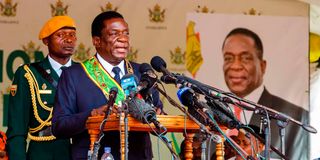Zimbabwe's Mnangagwa sets elections for August 23

Zimbabwe President Emmerson Mnangagwa has finally set August 23 as the long-awaited election date, ending speculation about the timing of the polls.
The 80-year-old President, who has been in power since a 2017 military coup that toppled long-time former ruler Robert Mugabe, made the proclamation after some haggling over electoral reforms.
Zimbabwe’s Parliament is still debating contentious proposed amendments to the Electoral Act that were supposed to come into effect before the polls.
With the announcement of the date of the polls, the election reforms will likely be abandoned, legal experts said.
Mnangagwa, whose first full term of office ends on August 26 after narrowly beating then 40-year-old Nelson Chamisa in the disputed 2018 elections, said nomination courts would vet aspiring presidential, parliamentary and local government poll candidates on June 21.
The presidential election run-off has been set for October 2. To avoid a run-off, a presidential candidate must win 50 percent plus one vote.
Chamisa, who now leads the opposition Citizens Coalition for Change (CCC) that was formed last year, had earlier expressed concerns about delays in the announcement of the poll date.
He said his party was ready to dislodge President Mnangagwa’s ruling Zanu PF, which has been in power since the country’s Independence from Britain in 1980.
“The only concern is Mnangagwa, who continues to duck and dive on the days of the election,” Chamisa told journalists in Harare after inspecting the voters’ roll on Tuesday.
After the announcement of the election date, Chamisa immediately tweeted: “Wednesday 23 August 2023 is a big day for Zimbabwe. #Thistime It’s time!”
Opposition parties and civil society have been up in arms against the Zimbabwe Electoral Commission (ZEC) for allegedly producing a flawed voters’ roll.
Some senior opposition figures said they could not find their names on the register after it was opened for inspection on Saturday.
The verification exercise will end on Thursday.
Zimbabweans now have two days to register to be included on the voters’ roll for this year’s elections.
Fadzayi Mahere, the CCC spokesperson, accused the government of trying to manipulate the polls using the voters' roll.
“They are terrified because, like all of us, they know that Zanu PF can never win a free and fair election in Zimbabwe,” Mr Mahere said.
“That is why they are trying to stitch and doctor the voters roll, but it won’t work.
“People want change.”
Both Zanu PF and opposition legislators were not happy about the new electoral boundaries demarcated by ZEC’s delimitation process, which was concluded early this year.
Critics said the independent elections management body had made grave errors in its delimitation report, including using wrong formulas to distribute voters among Zimbabwe’s 120 constituencies.
The Constitutional Court early this month dismissed a challenge by opposition leader Douglas Mwonzora that sought to set aside the delimitation report. There are now fears Zimbabwe could be headed for another disputed election.
If President Mnangagwa wins the August elections, it will be his last term according to Zimbabwe’s constitution.
A poll by a London-based public relations organisation, the SABI Strategy Group, that was commissioned by the South African Brenthurst Foundation late last year, said 53 percent of respondents said they would vote for the 45-year-old Chamisa while 40 percent said they would vote for the incumbent.
An Afrobarometer survey in February this year said the opposition enjoyed a four-point advantage (48 percent) over the ruling Zanu PF (44 percent) in voting preferences.





